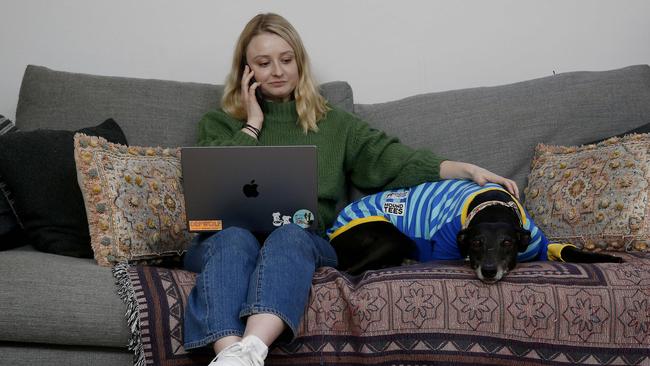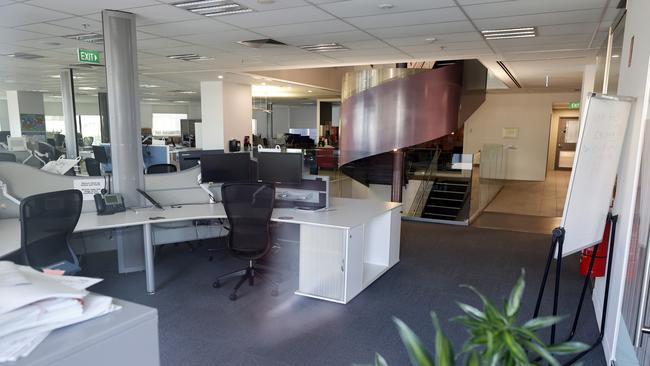‘Sticks and carrots’: Employers plan to cut pay for working from home, survey finds
Bosses say they are planning to cut pay for remote workers as they roll out “sticks and carrots” to get people back to the office.

At Work
Don't miss out on the headlines from At Work. Followed categories will be added to My News.
More than one-third of large Australian employers are planning to reduce the pay of staff who continue to work from home in the next three to five years, new research suggests.
And while 37 per cent have plans to “differentiate” pay between remote and in-office staff, 38 per cent say they expect working remotely will become a privilege earned through trust and seniority as companies explore “options for influencing staff’s working preferences through more formal incentivisation”, according to the Future of Work Report 2023 published on Monday by law firm Herbert Smith Freehills (HSF).
The report, which surveyed 500 senior managers at companies with more than 1000 employees around the world — including 100 respondents in Australia — found employers were using a mix of “sticks and carrots” to recall workers as they seek to wind back Covid-era work-from-home policies.
“In Australia, we’re seeing a range of approaches for getting people back in the office,” said HSF Melbourne partner Natalie Gaspar.
“Some employers are still doing soft encouragement — such as team lunches on Wednesdays, team drinks, or extra-curricular activities on certain days. Some are using more of a direct approach — you must be in the office on Wednesday, Thursday and Friday, for example. There’s only a handful of organisations mandating a full return to the workplace.”

The report notes that while return-to-office policies have sparked “activism” at several major companies including Amazon and Apple, “economic anxiety and widespread Covid vaccine rollouts have given employers leverage to recall workers”.
Seventy per cent of employers say they expect more work will be done in person in the next two years, compared with 16 per cent who expect more hybrid working and just 5 per cent who see more remote.
Most accept that hybrid working is here to stay, however.
Eighty-eight per cent of respondents in the survey said their workforce was at least partly hybrid, 63 per cent said they had redefined core hours to accommodate remote work, and 68 per cent plan to evaluate employees based on productivity rather than hours worked.
Still, many employers are “clearly pushing back on the intensely flexible working models necessitated by the pandemic, which many believe can discourage collaboration, limit mentorship and make it difficult to maintain a company culture”, the report said.
“A big issue we hear about is the stickiness of the culture and company loyalty,” said HSF Singapore’s Fatim Jumabhoy. “What makes staff feel connected to their employer if they’re never around a physical premises or colleagues? The relationship becomes more transactional.”
Employers also acknowledged the benefits of hybrid working.
Just under half (49 per cent) said it improved access to far-flung talent, and 68 per cent said it had boosted applicant diversity.

“We recognise that the new generation has different expectations and doesn’t want to be bound to the office from nine to five,” said Standard Chartered managing director Nicola Doran. “If we weren’t ahead of that, it would be a competitive disadvantage, and it would mean we couldn’t access the best talent.”
Companies were also wary about pushing employees too far.
Fifty-three per cent said forcing more in-office working could result in more activism or higher staff turnover. “If the job market gets better … you might see people moving to places where there’s more flexibility,” said HSF New York’s Tyler Hendry.
However, 81 per cent of employers said economic headwinds had reduced the prospects of activism over the last 18 months “as employees become more anxious about their jobs and less willing to rock the boat”.
The threat of automation and artificial intelligence also looms large.
Nearly two-thirds (64 per cent) of employers said they were already using automated tools to assess employee performance and to monitor staff both in the office (58 per cent) and remotely (52 per cent).
And a staggering 95 per cent are “using or plan to use AI to perform tasks previously done by workers, including customer service, clerical tasks, research and even creative work”.
Earlier this year, investment bank Goldman Sachs said generative AI tools like ChatGPT were a “major advancement” and could replace the equivalent of 300 million full-time jobs around the world.

The HSF report also noted flexible arrangements may be harming employees’ prospects, with 71 per cent of respondents saying those who work in the office will inevitably have more opportunities.
Return-to-office advocates have repeatedly issued similar warnings.
IBM’s global chief executive Arvind Krishna recently told the company’s 260,000 staff that while he was not ordering them back to the office yet, those who continued to work remotely would struggle to get promoted.
In May, a research paper published by the Federal Reserve Bank of New York found remote work “negatively impacts workers’ career trajectories”, mirroring similar findings from earlier studies.
New York University marketing professor Scott Galloway has previously warned young people about the perils of staying home. “You should never be at home,” he told The Wall Street Journal’s CEO Council Summit in May.
“That’s what I tell young people. Home is for seven hours of sleep and that’s it. The amount of time you spend at home is inversely correlated to your success professionally and romantically. You need to be out of the house.”
The HSF report comes after another global survey suggested the days of working from home were numbered.
KPMG’s survey of 1325 chief executives, including 50 from Australia, found two-thirds of Australia’s bosses believed traditional white-collar roles would see a full-time return to the office within three years.
Originally published as ‘Sticks and carrots’: Employers plan to cut pay for working from home, survey finds





